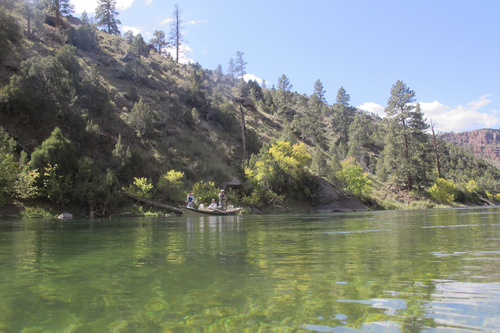This is an archived article that was published on sltrib.com in 2014, and information in the article may be outdated. It is provided only for personal research purposes and may not be reprinted.
Nearly two out of three Utah voters support the public lands initiative pushed by U.S. Rep. Rob Bishop.
In results released Wednesday by UtahPolicy.com, Republicans and those who identified themselves as very conservative were the most likely to strongly support a legislative push that aims to resolve long-standing land-use conflicts in eastern and southern Utah.
The question was one in a package on federal lands management and the last released by the nonpartisan online newsletter. The poll included questions about taking control of Bureau of Land Management lands and filing a lawsuit to force the federal government to turn them over — both approaches to the issue that seem to conflict with Bishop's plan. But a majority of Utahns support all three ideas.
Pollsters Dan Jones and Associates explained the process this way: "Congressman Rob Bishop is pursuing a public land initiative, which would consolidate some school trust lands in energy rich areas while preserving other land in more pristine locations. The plan also would speed up energy development in the Uinta Basin and other regions."
Sixty percent of Utah voters said they would back the congressman's approach to public lands planning.
Survey results released earlier this week also found 56 percent of Utahns oppose the creation of a Greater Canyonlands National Monument.
Another slim majority — 54 percent — support a lawsuit to gain control of lands administered by the Bureau of Land Management, and 52 percent want to take over U.S. Forest Service lands.
The poll questioned 406 registered voters between Sept. 30 and Oct. 2.
Some observers wonder whether suing the federal government would undermine, even derail, the legislative process that Bishop and Rep. Jason Chaffetz, both Republicans, have worked hard to advance.
At least seven counties are actively developing proposals that would identify areas they would like to open for extraction and separate lands suitable for wilderness and other conservation designations. The proposals will be wrapped into a bill Bishop intends to introduce next year.
In the meantime, a Utah state law demands the feds hand over title to 30 million acres by the end of this year.
A state takeover of all BLM and Forest Service lands could render moot the "grand bargain" political settlement Bishop envisions, but a spokeswoman in his office contends voter support for a state lawsuit is compatible with support for the Bishop process.
"Utahns across the board are frustrated with the status quo and want a change in how public lands are accessed and utilized," Melissa Subbotin said.
Even though the Bishop process could result in the largest additions ever to the state's wilderness areas, the poll found intense opposition to Bishop's initiative among liberals, according to Utah Policy managing editor Bryan Schott.
Democrats oppose it by a 15-point margin, but the intensity of their opposition is telling: One-third "strongly oppose" the process, while only 5 percent "strongly support" it.
The imbalance was even more extreme among those who identified as "very liberal."
Zions Bank helps fund Utah Policy's polling.



